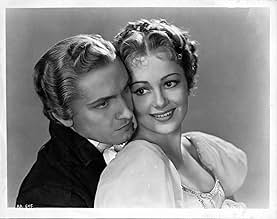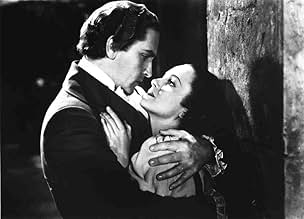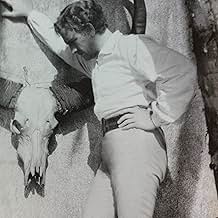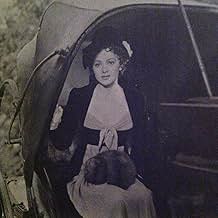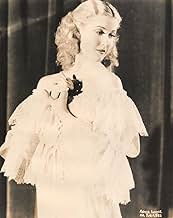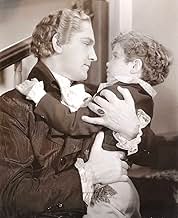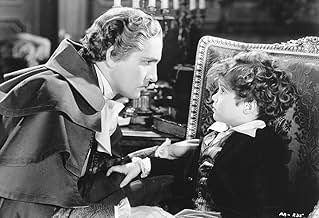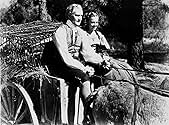IMDb-BEWERTUNG
6,3/10
2138
IHRE BEWERTUNG
Füge eine Handlung in deiner Sprache hinzuIn 18th-century Italy, an orphan's debt to the man who raised him threatens to separate him forever from the woman he loves.In 18th-century Italy, an orphan's debt to the man who raised him threatens to separate him forever from the woman he loves.In 18th-century Italy, an orphan's debt to the man who raised him threatens to separate him forever from the woman he loves.
- 4 Oscars gewonnen
- 8 Gewinne & 3 Nominierungen insgesamt
Empfohlene Bewertungen
Hervey Allen (1889-1949) spun quite an elaborate, sweeping 18th-19th century yarn in the form of a gigantic novel, published in 1933, called "Anthony Adverse." It became a best-seller, and three years later Warner Bros. brought it to the screen, directed by Mervyn LeRoy.
The film was very long, comprehensive, and romanitc, in Allen's quasi-Dumas-Dickens-Tolstoy style.
Heading the cast were four of the screen's finest actors, leading players Fredric March and Olivia de Havilland; and supporting character players Claude Rains and Gale Sondergaard.
Providing the musical score was the legendary Eric Wolfgang Korngold (with orchestrations by Hugo Friedhofer) and classic masque and operatic excerpts by Monteverdi and Francetti.
The 141-minute film today seems much longer than it is, as we follow Anthony's detailed "adventures" in Europe, Cuba, and Africa, with America targeted as a final future destination. The whole production, which was considered of blockbuster size in 1933 (and still looks impressive), emerges more like a historic relic that is occasionally pulled from a treasure cabinet, to observe and ponder.
The whole feel of the film now seems dated and out-of-fashion, but then that's what most memorabilia is. It's merely dusted it off, polished, felt for the moment, then replaced along side other treasured pieces from the past.
The film was very long, comprehensive, and romanitc, in Allen's quasi-Dumas-Dickens-Tolstoy style.
Heading the cast were four of the screen's finest actors, leading players Fredric March and Olivia de Havilland; and supporting character players Claude Rains and Gale Sondergaard.
Providing the musical score was the legendary Eric Wolfgang Korngold (with orchestrations by Hugo Friedhofer) and classic masque and operatic excerpts by Monteverdi and Francetti.
The 141-minute film today seems much longer than it is, as we follow Anthony's detailed "adventures" in Europe, Cuba, and Africa, with America targeted as a final future destination. The whole production, which was considered of blockbuster size in 1933 (and still looks impressive), emerges more like a historic relic that is occasionally pulled from a treasure cabinet, to observe and ponder.
The whole feel of the film now seems dated and out-of-fashion, but then that's what most memorabilia is. It's merely dusted it off, polished, felt for the moment, then replaced along side other treasured pieces from the past.
Wrongheaded critics:
There are more than one user reviews posted here including one that says the film should get zero stars because it deals with slavery. I think such an attitude about a movie that was made at any time let alone the 1930s is absurd. Are they supposed to pretend that slavery in the 1700s somehow did not exist and that many many people were involved in this trade? It's idiotic. The film clearly shows that there were those risking their lives in opposition to the slave trade and that there were others who were corrupted by the wealth and power that they gained from it. So to those pretentious and moralistic critics, I say get off your self righteous high horse and look at this film and all others in its proper historical context.
Today both Hervey Allen and his novel, Anthony Adverse, are all but forgotten, as is the 1936 Mervyn Leroy adaptation. Allen has never been granted a biography or a critical study( one could also say the same thing about Mervyn Leroy) while both the novel and the film are dismissed as over blown, prolix "white elephants". This is not entirely fair. Allens 1200 page colossus was the greatest best seller of its day, and was only surpassed when Margaret Mitchell wrote Gone With The Wind, while Leroys film isn't bad. In fact it is pretty good, in its own way. First of all, Leroy managed to condense Allens erudite, baroque epic into the space of a two -hour, black and white film. In doing so, he managed to retain most of the novels elaborate religious symbolism( Allen seems to have been either a Lapsed, but still affectionate Catholic or an Episcopalian of the "high church " variety with a fascination with Priests, The Virgin Mary, and Crucifixion symbols), all of the colorful characters( Allen seems to have ransacked Tolstoy, Dickens, Dumas, and Balzac for ideas.), and most of the action.( the carriage chase in the Alps is one of the great "scenes" of thirties cinema). The film has also retained the novels plot, or most of it. One would not know, for example, that the hero ends up dying rather UNheroically in Texas sometime in the early eighteen twenties, or that the book has a truly bizarre, ambiguous epilogue in which "white trash" settlers of Texas from Missouri stumble across the statuette of the virgin and the ruins of Adverses estate.The great problem with the book -and with the film- is that Anthony Adverse is NOT a heroic figure. He is played upon, not player, a passive, frequently humiliated victim of adversity. Clearly, Allen wanted to make him a philosophical hero, not a swashbuckler. He is a clerk, for heavens sake. Most of the time, he is engaged in capitalist transactions of some sort, instead of sword-play. ( indeed, the only sword- play in the movie is between the villainous Don Luis and Anthony's father.)The basic action is simple. One Priest gives Anthony a mind,by teaching him. Another gives him a soul, by reminding him that slavery is a sin( Incidentally, the film is a powerful indictment of slavery and racism). Finally, Olivia De Havillands character gives him a heart, by introducing him to the son he never knew he had. March-a very fine actor at his best- seems curiously flat and passive in the role of Adverse. The truly great performances are by Claude Rains and Gale Sondergaard as the over the top super-villains. Rains exhudes decadence, arrogance and sadism, while Sondergaard won the first best supporting actress Oscar, simply by grinning satanically for two hours.
I rented a tape of Anthony Adverse mainly to see what kind of performance the Academy was looking for in the first-awarded "best supporting actress" category. Gale Sondergaard's time on camera was actually quite brief and her villainous role required a strictly one-dimensional reading. There were no subtleties whatsoever, nor was there any need in the film for them. Ordinarily, it might seem surprising that her part would receive any attention at all, not to mention a prestigious award, but keeping in mind that Oscars in those days were to a large extent self-congratulatory spectacles passed around from studio to studio year by year, it really isn't surprising.
The film was long and episodic, as was the novel, and not particularly good at that. There was the glitz we've come to expect of course with the duels and chases thrown in for good measure. I kept wondering if the novel was written with Hollywood in mind. It's hardly readable nowadays. As far as directorial touches are concerned, it's no wonder that Mervyn LeRoy has long disappeared from anyone's pantheon. The kiddie-car version of France must have excited the Depression audiences. The film is very long and very expensive so perhaps there's something to say about that.
The film was long and episodic, as was the novel, and not particularly good at that. There was the glitz we've come to expect of course with the duels and chases thrown in for good measure. I kept wondering if the novel was written with Hollywood in mind. It's hardly readable nowadays. As far as directorial touches are concerned, it's no wonder that Mervyn LeRoy has long disappeared from anyone's pantheon. The kiddie-car version of France must have excited the Depression audiences. The film is very long and very expensive so perhaps there's something to say about that.
I just watched the Warner Archive DVD-R of this movie last night. I want to say that it is a good movie and much underrated by the IMDb score of 6.6. It deserves at least a 7.6; I give it an 8.
It is beautifully filmed, the sets are gorgeous, and the cast of actors is stellar and does a good job with the material. Even the players with smaller roles are well-known actors, and they deliver their short moments with just the right emphasis. If you're an old film fan, you can't watch the movie without seeing a score of faces that you know and love.
The two main complaints I see here are that Fredric March is too old to play a convincing lover for De Havilland, and that the movie is somewhat pedestrian and dragging.
On the first point, yes, in some scenes the age difference in visible, but in others, March is made up to look younger than his biological age, and is convincing as a younger man. But the key thing is that March is *good* in the role. If you overlook the physical signs of his age, and concentrate on his characterization, delivery, etc., you can see he is acting thoughtfully, trying to do justice to his complex character. I think it's an excellent performance.
Pedestrian and dragged-out? Well, the film is long, as these epic-type films tend to be. Yet I did not find that my interest flagged. The film deals with years of the lives of these characters, and it needs to be long to get in all the complex background of European history and the changes in the lives of the characters (not to mention the important back-story of Anthony's birth).
One more thing: some commenters thought that Gale Sondergaard did little to earn her Oscar for this one. I thought she was very good. Normally she plays the sinister villainess in a very broad manner that telegraphs how evil and sinister she is; in fact, she was often hired because she was so good at that kind of thing (see her many Universal horror and mystery films). Here, she shows a bit of that sinister character, but underplays it greatly, to very good effect. She would never have earned an Oscar had she played the role in her heavy Universal style. I think it's the subtlest performance I've seen her give.
The sound on the Archives DVD-R is at first a tiny bit harsh, especially the booming orchestra with the grand Korngold score; this I noticed especially near the beginning of the film, and was worried it would spoil the film for me. However, the sound seemed to become a bit gentler about 10 or 15 minutes into the movie -- or maybe I just got used to it. But the volume of characters's speeches was definitely a bit uneven in the first few minutes. That happens, with movies this old. Perfect prints are rare, and DVDs reflect the imperfections. Overall, however, the DVD was quite watchable and the audio was clear and adequate.
I recommend this as a historical epic. Not one the greatest epics, to be sure, but quite a good one, and admirably executed. Maybe not a must-see, but certainly nothing you will regret seeing. I will watch it more than once, I think.
It is beautifully filmed, the sets are gorgeous, and the cast of actors is stellar and does a good job with the material. Even the players with smaller roles are well-known actors, and they deliver their short moments with just the right emphasis. If you're an old film fan, you can't watch the movie without seeing a score of faces that you know and love.
The two main complaints I see here are that Fredric March is too old to play a convincing lover for De Havilland, and that the movie is somewhat pedestrian and dragging.
On the first point, yes, in some scenes the age difference in visible, but in others, March is made up to look younger than his biological age, and is convincing as a younger man. But the key thing is that March is *good* in the role. If you overlook the physical signs of his age, and concentrate on his characterization, delivery, etc., you can see he is acting thoughtfully, trying to do justice to his complex character. I think it's an excellent performance.
Pedestrian and dragged-out? Well, the film is long, as these epic-type films tend to be. Yet I did not find that my interest flagged. The film deals with years of the lives of these characters, and it needs to be long to get in all the complex background of European history and the changes in the lives of the characters (not to mention the important back-story of Anthony's birth).
One more thing: some commenters thought that Gale Sondergaard did little to earn her Oscar for this one. I thought she was very good. Normally she plays the sinister villainess in a very broad manner that telegraphs how evil and sinister she is; in fact, she was often hired because she was so good at that kind of thing (see her many Universal horror and mystery films). Here, she shows a bit of that sinister character, but underplays it greatly, to very good effect. She would never have earned an Oscar had she played the role in her heavy Universal style. I think it's the subtlest performance I've seen her give.
The sound on the Archives DVD-R is at first a tiny bit harsh, especially the booming orchestra with the grand Korngold score; this I noticed especially near the beginning of the film, and was worried it would spoil the film for me. However, the sound seemed to become a bit gentler about 10 or 15 minutes into the movie -- or maybe I just got used to it. But the volume of characters's speeches was definitely a bit uneven in the first few minutes. That happens, with movies this old. Perfect prints are rare, and DVDs reflect the imperfections. Overall, however, the DVD was quite watchable and the audio was clear and adequate.
I recommend this as a historical epic. Not one the greatest epics, to be sure, but quite a good one, and admirably executed. Maybe not a must-see, but certainly nothing you will regret seeing. I will watch it more than once, I think.
Wusstest du schon
- WissenswertesGale Sondergaard made her film debut in "Anthony Adverse" and won an Academy Award in the brand-new category of Best Supporting Actress.
- PatzerDuring the duel between Don Luis and Denis Moore, the sword wielded by Moore was "unbated", i.e. his fencing foil was blunted with a protective guard on the tip.
- Zitate
[first title card]
Title Card: Those who are destined to live during times of war and social upheaval are victims of cruel fate ~~ unable to find comfort in the past or peace in the present. They are the spiritual orphans of the world.
- VerbindungenFeatured in The Making of a Great Motion Picture (1936)
- SoundtracksI'll Wait For You My Love (Angela's Song)
(uncredited)
Composer: Erich Wolfgang Korngold
Lyrics by Howard Koch (uncredited)
Sung by Carol Ellis (uncredited)
Top-Auswahl
Melde dich zum Bewerten an und greife auf die Watchlist für personalisierte Empfehlungen zu.
- How long is Anthony Adverse?Powered by Alexa
Details
- Erscheinungsdatum
- Herkunftsland
- Sprachen
- Auch bekannt als
- Anthony Adverse
- Drehorte
- Produktionsfirma
- Weitere beteiligte Unternehmen bei IMDbPro anzeigen
Box Office
- Budget
- 1.050.500 $ (geschätzt)
- Laufzeit2 Stunden 21 Minuten
- Farbe
- Sound-Mix
- Seitenverhältnis
- 1.37 : 1
Zu dieser Seite beitragen
Bearbeitung vorschlagen oder fehlenden Inhalt hinzufügen


